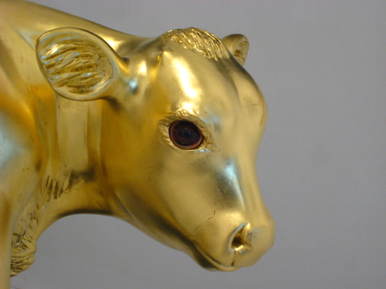
The Mishkan (or Tabernacle) is the portable sanctuary made of tent poles and hanging textiles that the Israelites built in the wilderness. It is the the focal point of the last five Torah portions in the book of Exodus.
The Mishkan may not make a great movie, but it represents the culmination of the book's story. After God brought the Israelites out of slavery in Egypt, after God gave them the law at Mount Sinai, the Israelites needed a way to maintain their relationship with God. The Mishkan was the place where the relationship continued. It was the model for the Temple in Jerusalem that eventually would be the center of the Israelite's civilization – the place where they met with God.
The Mishkan is described in the latter part of Exodus with exhausting detail – right down to the tent pegs and the bells on the hem of the High Priest's robes. Yet, there is an oddity in the chapters that tell us about the Mishkan. Of the last five Torah portions in Exodus, two describe the design of the Mishkan and two describe its actual construction. In between these, this week's Torah portion (Ki Tisa) tells the story of the Golden Calf, the idol that the Israelites built while Moses was on the top of Mount Sinai receiving the tablets of the Ten Commandments.
Why, we might wonder, does the Torah put the Golden Calf – the most infamous example of forbidden idolatry in the Torah – right in the middle of the building of the Mishkan? Why is the description of the most holy place in Jewish tradition interrupted by our most devastating story of desecration?
The traditional understanding about the placement of the Golden Calf story in the book of Exodus is given by the great medieval commentator, Rashi. Quoting the Talmud, Rashi says that "There is no earlier and there is no later in the Torah" (B. Pesachim 6b), that is, the events in the Torah are not given in chronological order. According to Rashi, the building of the Golden Calf actually preceded the instruction to build the Mishkan by a few weeks. It did not literally occur in the moment between conception and realization. The story is told out of order.
While Rashi's assertion about chronology makes the narrative flow of Exodus more sensible, it does not explain why the the order of events was altered in the Torah. What does the position of the Golden Calf story teach us?
Perhaps the figurative presence of the Golden Calf in the Mishkah is meant to remind us that even the most heartfelt and holy worship contains an aspect of idolatry. There is no way for human beings to turn our hearts toward God in gratitude and reverence without, at the same time, engaging in the worship of something that is not God.
What do I mean by that? Consider what must happen within our hearts and minds when we intend to worship God.
If we engage in dialogue with God when we pray, we must first think of ourselves as being separate from God. We are here below and God is up above. God is the Creator and we are the created. However, the moment that we consider ourselves to be separate from God, we also conceive of ourselves as being self-aware and self-conscious entities. We become concerned with our own egos as much as we are concerned with God. We ask ourselves, "Am I doing this the right way? How does my praying to God make me feel about myself? Do I think it makes me a good person? How will others perceive me as I offer my worship to God?"
Those self-conscious thoughts that we bring with us into prayer may also lead to other thoughts. We begin to wonder: Is the palace I have built for worshipping God grand enough? Will God be pleased with my work? Will it be impressive enough to others? Will it bring me and my community a reputation for our piety and prestige? Will others envy us?
The moment we begin to worship God we begin to worship ourselves – in ways that are subtle and not so subtle. The moment we conceive of ourselves as separate from God, we engage in idolatry.
How can we avoid the paradox of worshipping ourselves when we want to worship God? We can try to remember that we have no real existence that is separate from God's existence. We can try to quiet our egos and allow God's presence to fill our minds.
In all humility, though, we must know that we are bound to fail. God has created us with very powerful psyches. We cannot hold onto the idea that we are a part of God for very long before our minds assert themselves and insist upon our separate reality. We cannot lose our egos entirely because – well – that's just the way that God has made us.
So, the paradoxical antidote to our hopeless egotism and inevitable idolatry is simply to be aware of it. That is why there is a Golden Calf sitting right in the center of the Mishkan. It is there to remind us that we are bound to worship our prideful selves and to lose sight of God even in the moment when we believe that we are being our most pious. We will build our idols exactly in the moment that we build our Temples.
That is why we read about the Golden Calf this week. It is the only way that we can protect ourselves from ourselves. We remember the idol the Israelites built so that we will also notice the idol within us.
Other Posts on This Topic:
Vayikra: Should I Bow to a Block of Wood?
Angels in the Architecture

 RSS Feed
RSS Feed
